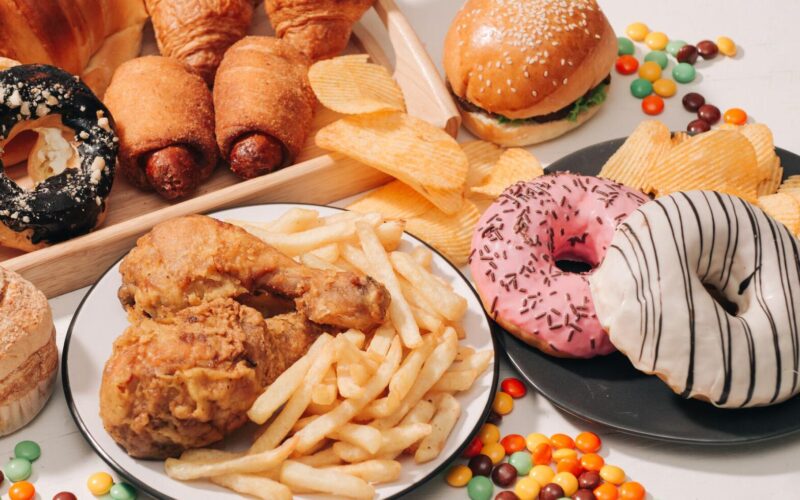Studies link ultraprocessed foods to cancer and early death. Two new, large-scale studies of people in the United States and Italy found that eating a lot of ultraprocessed foods significantly increased the risk of colorectal cancer in men, and can lead to heart disease and early death in both sexes. The studies were published Wednesday in the British medical journal The BMJ.
Soups, sauces, frozen pizza, ready-to-eat meals, and comfort foods like hot dogs, sausages, french fries, drinks, store-bought cookies, cakes, sweets, doughnuts, ice cream, and many others all fall into the category of ultraprocessed foods.
Author of several books on food politics and marketing, including “Soda Politics: Taking on Big Soda (and Winning)” (2015), Marion Nestle claims that “literally hundreds of studies link ultra-processed foods to obesity, cancer, cardiovascular disease, and general mortality.”
Ultraprocessed foods are unambiguously connected with an elevated risk for chronic disease, said Nestle, who was not involved in either study.
The presence of a cancer connection
Ultraprocessed foods were linked to an increased risk of colorectal cancer in males, but not women, according to a study that followed the eating habits of nearly 200,000 Americans for up to 28 years.
According to the World Health Organization, the American Cancer Society, and the American Institute for Cancer Research, processed and ultraprocessed meats including ham, bacon, salami, hotdogs, beef jerky, and corned beef have long been linked to an increased risk of bowel cancer in both men and women.
However, the latest research discovered that all ultraprocessed food kinds contributed.
Cancer epidemiologist and head of the division of nutrition epidemiology and data science at Tufts University’s Friedman School of Nutrition Science and Policy in Boston, and co-senior author Fang Fang Zhang, found that men in the highest quintile of ultraprocessed food consumption had a 29% higher risk of developing colorectal cancer.
This correlation persisted even after researchers accounted for factors like BMI and diet quality.
Why wasn’t the same risk for female colorectal cancer discovered in the recent study?
Zhang speculated that the differing roles played by obesity, sex hormones, and metabolic hormones in men and women may be to blame.
Dr. Robin Mendelsohn, a gastroenterologist at Memorial Sloan Kettering Cancer Center in New York City who was not involved in the study, speculated that “women may have chosen ‘healthier’ ultraprocessed foods.”
In fact, the study found that “greater consumption of ultraprocessed dairy items — such as yogurt — was associated with a decreased risk of colorectal cancer in women,” as stated by the study’s author, Dr. Zhang. “Whole grain foods with little or no added sugars, yogurt, and dairy foods are examples of ultraprocessed foods that can be considered healthy.”
Consumption of ready-to-eat or heated meals, such as pizza, was associated with an increased risk of colorectal cancer in women, she concluded. Yet, Zhang noted that a high intake of ready-to-eat products based on meat, poultry, or shellfish, as well as sugar-sweetened beverages, was associated with an increased risk of colon cancer in men.
Adults get 58% of their calories from ultraprocessed foods and kids get 67%, she said. To reduce our risk of cancer, obesity, and cardiovascular disease, “we should think about replacing the ultraprocessed meals with unprocessed or slightly processed items in our diet.”
Linked to an increased risk of dying young
During the course of the second study, around 22,000 persons in Italy’s Molise area were monitored for a period of 12 years. Beginning in March 2005, this study sought to identify potential precursors of cancer, cardiovascular illness, and neurological disorders.
The BMJ released an analysis contrasting the contribution of ultraprocessed diets and nutrient-poor foods to the onset of chronic disease and premature death. Both types of diets were found to raise the risk of death, particularly from cardiovascular diseases, independently.
Epidemiologist Marialaura Bonaccio, from the department of epidemiology and prevention at the IRCCS Neurologico Mediterraneo Neuromed in Pozzilli, Italy, and her colleagues found that ultra-processed meals were “paramount to define the risk of mortality.”
According to Bonaccio’s remark, “nearly 80% of the meals categorized as nutritionally harmful by the parameters adopted in the study were also ultraprocessed.”
The fact that these foods are predominantly ultraprocessed “suggests that the higher risk of death is not related directly (or primarily) to the low nutritional content of particular goods,” Bonaccio said.
Rather than genuine foods
When compared to their less processed counterparts, why do ultraprocessed foods have such a negative impact on human health? One reason is that they are not whole meals but rather “ready-to-eat-or-heat industrial concoctions produced with components derived from foods or synthesized in laboratories,” Zhang explained to CNN.
Chemical additives including fake colors, flavors, and stabilizers are commonplace in these highly processed foods, along with added sugars and salt.
“While some ultraprocessed meals may be regarded healthier than others, in general, we would advocate avoiding away from ultraprocessed foods totally and focusing on healthy unprocessed foods — fruits, vegetables, and legumes,” Mendelsohn added.
The results of a randomized clinical trial comparing a processed and unprocessed diet were released in 2019 by the National Institutes of Health (NIH). Those who consumed an ultraprocessed diet ate more quickly and consumed an extra 500 calories daily compared to those who consumed a diet low in processed items.
The NIH found that people who ate the ultraprocessed diet gained around 2 pounds on average, while those who ate the unprocessed diet dropped about the same amount.
According to Nestle, “something about ultraprocessed foods” causes individuals to consume more of them than they intend to.
“The results of eating highly processed meals are evident. Not knowing what caused the consequences is a major problem “In continuation, Nestle said. “Until we find out why, it’s advisable to suggest eating ultraprocessed meals in as minimal a quantity as feasible,” the authors write.









